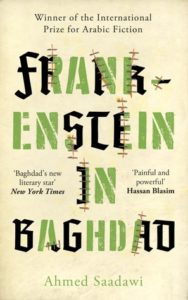 Title: Flights (Goodreads)
Title: Flights (Goodreads)
Author: Olga Tokarczuk
Translator: Jennifer Croft
Published: Fitzcarraldo Editions, 2017
Pages: 410
Genres: Literary Fiction
My Copy: Paperback
Buy: Amazon, Book Depository, Kindle, Wordery (or visit your local Indie bookstore)
Winner of the Man Booker International Prize 2018
Shortlisted for the National Book Award for Translated Literature 2018
Longlisted for the Warwick Prize for Women in Translation 2018
Longlisted for the BTBA 2019
Flights by Olga Tokarczuk was the final novel I have to read for the Man Booker International Prize shortlist, and what a book to go out on. Tokarczuk is a Polish writer that has not gotten much attention in the English-speaking world until recently. She has won the Nike Award (which is a Polish literary award) twice for her novel Bieguni in 2008 and Księgi jakubowe (The Books of Jacob) in 2015. Curiously, Flights is the English title for Bieguni which I believe roughly translates to Runners.
Sitting here, I find it very difficult to write a review of Flights, it feels more like a novel that should be experienced rather than written about. It is an experimental novel that focuses more on travel writing rather than an actual plot. The narrative is musing on what it means to travel the world rather than her story. However, this works really well, and I wonder if this is the type of book that should be in the seat pocket of every plane for the travellers to read and reflect on their own experiences.
I am a fan of the postmodern novel so I am never disappointed if there is a lack of plot or character development, provided that the author is doing something interesting enough to keep my attention. If I was to compare this to any other book on the Man Booker International Prize longlist, I would compare it to The White Book. Simply because this is the fragmented musings of a writer on a particular topic, in this case travel. Exploring the oddness of modern travel, the airports, hotels, public transport and even guide books. There is so much to meditate one, I am actually surprised she was able to spend so much time with this one topic and cover so many different aspects.
The narrator describes herself as a pilgrim and I found myself to be her companion. I had an intimate knowledge of every thought and feeling she had. I have heard that this book shares so many similarities to Moby Dick and I have never wanted to read this Herman Melville classic more. Although I might simply read Moby Dick just so I can reread Flights.
To say I was enchanted by Flights might be an understatement, at times I was transfixed, and I never wanted to leave this book. I know Jennifer Croft probably has a busy life but I really hope she translates some of Olga Tokarczuk’s other novels. I recently found out that she was a founding editor of The Buenos Aires Review (which has not released new content since December 2017) along with Pola Oloixarac (who wrote the amazing Savage Theories) and Heather Cleary (who has translated a few Sergio Chejfec novels for Open Letter). My love of Argentinian literature is pleased to find that this is bilingual magazine. Croft has also translated August by Argentinian author Romina Paula, which I have recently ordered from Feminist Press. Now that I have finished being distracted by the translator, I cannot recommend Flights enough, especially if you are interested in travel writing.

 Title: Frankenstein in Baghdad (
Title: Frankenstein in Baghdad ( Title: The Last Wolf / Herman (
Title: The Last Wolf / Herman ( Title: The Savage Detectives (
Title: The Savage Detectives ( Title: The Slaves of Solitude (
Title: The Slaves of Solitude ( Title: Missing Person (
Title: Missing Person ( Title: The Meursault Investigation (
Title: The Meursault Investigation ( Title: The Dead Lake (
Title: The Dead Lake ( Title: Numero Zero (
Title: Numero Zero ( Title: Me and the Devil (
Title: Me and the Devil (